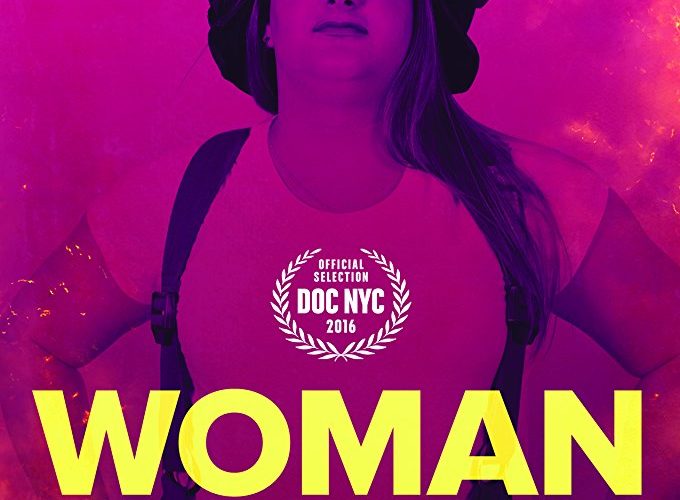I’m not sure anyone could have written a better script than Brooke Guinan’s real life to truly focus on what it means to be a transgender person in a bigoted, “traditional” world. Here’s a woman born as George Guinan VI into a FDNY (New York Fire Department) family, whose adolescence was met with constant ridicule and bullying as an “other.” She not only had to come out to her parents at the age of eleven, but again when the decision to transition into a woman arrived. She had to fight for her place within a life that is still situated under a patriarchal umbrella—a battle that even saw her go back into the closet to not “rock the boat” more than she already was. And she persevered.

Brooke evolved into someone that finally resembled the person she knew she was but could never see with her eyes open. More than that she became an LGBTQ icon, a passionate firefighting recruiter, and champion for inclusion. And documentarian Julie Sokolow makes sure every single aspect of this trailblazing life finds the spotlight to simultaneously inform, educate, resonate, and embolden. Woman on Fire doesn’t therefore simply depict the process of a woman finding the courage to let her identity loose upon an occupation unversed in supporting female co-workers let alone trans women, it also deftly captures the metamorphosis of those around her through candid conversations that are unafraid to admit initial prejudices. Everyone onscreen had his/her knee-jerk reactions and uncertainty as far as overcoming them. But they did.
As a result this film becomes an enlightened document of what the United States can be in the twenty-first century. It’s a place where a mother (Susan Guinan) can move past the hetero-normative future she was raised to believe was a foregone conclusion—an imperative beyond “normal” since her mind didn’t possess any possible alternatives. It’s a nation where a father (George Guinan V) can see himself in a child as different from him as can be because he too was journeying towards a happiness that could only come after leaving his old self behind. Both of Brooke’s parents freely admit their anger and disappointment. They talk about the struggle endured to reinvent their principles in a way no one in their families had ever had to do.

There’s an immense amount of hope in this transformation—one that can often be forgotten in the shadow of the giant physical, emotional, and psychological leap taken by their catalyst. Too many stories like Brooke’s come with the reality that the person’s conservative-minded families simply walk away. It’s a result that’s common enough to give an LGBTQ member pause as far as embracing their true selves in the face of such a huge risk. You could say that just as Brooke grows into being a spokeswoman for a community in desperate need of a victory (her personal and professional success is a testament to the soul that resides within the body she was given), her parents prove the same. Their understanding of love and equality is inspiring.
Credit them all for never letting Sokolow’s camera become a crutch to hide behind. They all accept their shortcomings and own their mistakes. They realize that this story is bigger than just Brooke because of all the aspects it touches upon from the FDNY boys’ club mentality to 9/11 to finding love as a trans person to actually showing how change is real in all sectors of life. Brooke expresses how it feels to be trapped and conversely set free. Susan and George epitomize what it means to be a parent possessed with unconditional love. And Brooke’s fiancé James L. Baker arrives—as a heterosexual male—to prove true love is possible no matter the odds. It’s insane how many “impossibilities” this one family ultimately conquers.

The real rarity, however, is the fact that everything we see is authentic. Sokolow is obviously working to remove stigma by shining Brooke’s experiences in a heroic light, but it is earned. Whether or not my eyes deceived me as far as the Guinan’s having another daughter, her absence (whether a product of privacy, animosity, or a million other reasons) doesn’t diminish what we do see: namely a support group consisting of family, friends, employers, and the community. Not everyone has one that is this extensive, but the way Brooke is presented makes viewers know that she’d personally be in your corner if you needed her. Just as her parents rallied around her, she strives to open her arms to those in search of a safe, welcoming home.
We hear about the discrimination she faced and still faces from both genders. We witness the slander written about her fellow firefighter Sarinya Srisakul for being a woman in a “man’s” job. We see George’s eyes opening to the systemic problems inherent to a career he devoted his life towards just as Susan recognizes the hard truth that she’d still be ignorant to the concept of “trans” if not for having a trans woman in her life. It’s this last reality that succinctly expresses why Woman on Fire is so important. People will only accept that which they fear after they personally know it. To see someone like you reconcile his/her archaic traditions with present-day empathy may just be the spark you need to remember humanity transcends the physical form.
Woman on Fire screened at the Buffalo International Film Festival.

